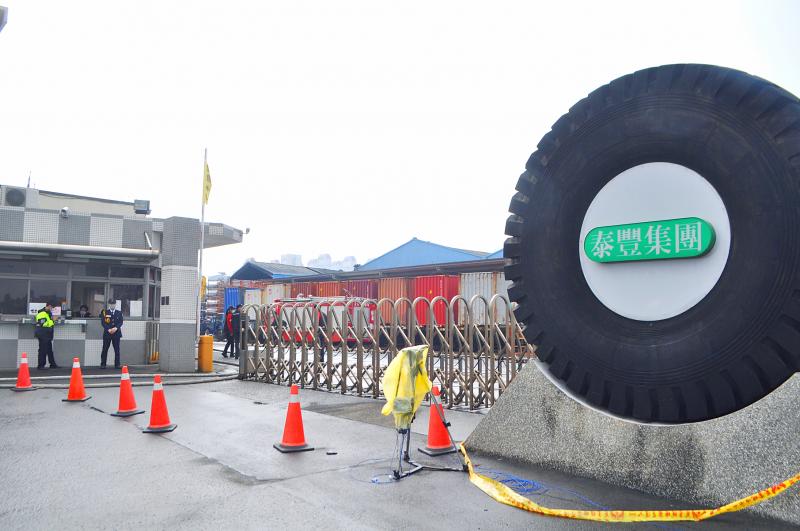Automobile and truck tire maker Federal Corp (泰豐輪胎) yesterday said that it has shut a factory in Taoyuan’s Jhongli District (中壢), as it has lost substantial orders following a steep anti-dumping tariff imposed by the US.
Federal Corp’s decision came after the US Department of Commerce on May 24 ruled that Taiwanese tire manufacturers have to pay anti-dumping tariffs of 20.04 to 101.84 percent.
Federal Corp faces a duty of 84.75 percent on tire exports to the US, up from a 4 percent levy on local suppliers in the past.

Photo: CNA
Cheng Shin Rubber Industry Co (正新輪胎) has tariffs of 20.04 percent and Nankang Rubber Tire Corp (南港輪胎) faces the stiffest penalty of 101.84 percent, the department has said.
“The anti-dumping duty has severely affected the company’s operations. Considering the levy’s threat to the company’s survival, the board of directors approved the proposal to close down the Jhongli plant entirely to safeguard shareholders’ interests,” Federal Corp said in a statement submitted to the Taiwan Stock Exchange.
Federal Corp expects the ruling to have a severe effect on its US orders and revenue, as more than 80 percent of the tires made at the factory are exported to the US, the statement said.
The Jhongli plant contributed about 27 percent to the company’s revenue of NT$549 million (US$19.85 million) in the first quarter, Federal Corp said.
The plant has installed capacity of 1.8 million tires a year, it said.
To cut costs and squeeze out more cash, Federal Corp has submitted an application to lay off a lot of workers, the company said.
It also plans to auction the Jhongli facilities and land, it said.
It has laid out a long-term business strategy to recoup lost exports to the US, while stepping up collaboration with overseas original electronics manufacturers to circumvent the duty, it said.

Sweeping policy changes under US Secretary of Health and Human Services Robert F. Kennedy Jr are having a chilling effect on vaccine makers as anti-vaccine rhetoric has turned into concrete changes in inoculation schedules and recommendations, investors and executives said. The administration of US President Donald Trump has in the past year upended vaccine recommendations, with the country last month ending its longstanding guidance that all children receive inoculations against flu, hepatitis A and other diseases. The unprecedented changes have led to diminished vaccine usage, hurt the investment case for some biotechs, and created a drag that would likely dent revenues and

Global semiconductor stocks advanced yesterday, as comments by Nvidia Corp chief executive officer Jensen Huang (黃仁勳) at Davos, Switzerland, helped reinforce investor enthusiasm for artificial intelligence (AI). Samsung Electronics Co gained as much as 5 percent to an all-time high, helping drive South Korea’s benchmark KOSPI above 5,000 for the first time. That came after the Philadelphia Semiconductor Index rose more than 3 percent to a fresh record on Wednesday, with a boost from Nvidia. The gains came amid broad risk-on trade after US President Donald Trump withdrew his threat of tariffs on some European nations over backing for Greenland. Huang further

Nvidia Corp’s GB300 platform is expected to account for 70 to 80 percent of global artificial intelligence (AI) server rack shipments this year, while adoption of its next-generation Vera Rubin 200 platform is to gradually gain momentum after the third quarter of the year, TrendForce Corp (集邦科技) said. Servers based on Nvidia’s GB300 chips entered mass production last quarter and they are expected to become the mainstay models for Taiwanese server manufacturers this year, Trendforce analyst Frank Kung (龔明德) said in an interview. This year is expected to be a breakout year for AI servers based on a variety of chips, as

HSBC Bank Taiwan Ltd (匯豐台灣商銀) and the Taiwan High Prosecutors Office recently signed a memorandum of understanding (MOU) to enhance cooperation on the suspicious transaction analysis mechanism. This landmark agreement makes HSBC the first foreign bank in Taiwan to establish such a partnership with the High Prosecutors Office, underscoring its commitment to active anti-fraud initiatives, financial inclusion, and the “Treating Customers Fairly” principle. Through this deep public-private collaboration, both parties aim to co-create a secure financial ecosystem via early warning detection and precise fraud prevention technologies. At the signing ceremony, HSBC Taiwan CEO and head of banking Adam Chen (陳志堅)